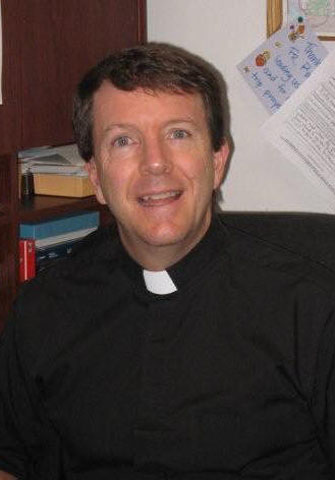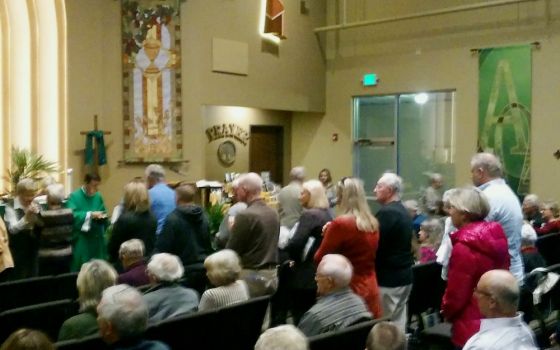
Fr. James Radloff
Fr. James Radloff's status as a priest in good standing in the diocese of Baker, Ore., has come to an end as he announced in an open letter Tuesday that he is leaving the Roman Catholic Church to "continue my journey as a priest" with a breakaway denomination, the Evangelical Catholic Church.
In addition, Radloff told NCR he has sent a demand through his civil attorney to Baker Bishop Liam Cary to "turn over a complete copy of my personnel records, and everything he used to make his decision."
That decision was to implement a formal removal of Radloff as pastor of St. Francis of Assisi Parish in Bend, effective Oct. 1, 2013. At the time of the ouster, Cary praised Radloff's ministry at the diocese's largest and Bend's only parish. The bishop said Radloff remained a priest in good standing and had done nothing illegal. Cary refused to reveal the reasons for the termination, stating that he was "not at liberty to do so."
No change in Radloff's status with the diocese was announced even after the Vatican Congregation for Clergy rejected the pastor's appeal of Cary's action. Dated Jan. 31 and made public in Bend on Feb. 14, the ruling let Cary's removal of Radloff stand, allowed the bishop to keep the reasons private, and did not require lifting the ban on public ministry imposed on Radloff.
Breaking silence on his view of the ruling, Radloff told NCR he was "terribly disappointed with the entire process."
"My word was never taken seriously or even considered as being valid in this whole process," he wrote in an email. "I was treated as if I was guilty until found guilty by a kangaroo court. The Congregation for Clergy never did a proper investigation. All that was seen is the old boys' club protecting each other. My lawyer friends were shocked by the ineptitude of the whole process. They saw that due diligence was never done. Mediation was never allowed even though it is the preferred method as set forth in the Code of Canon Law."
The priest added, "It seems to me the bishop decided to make an example of me to show his clergy and the people his power. So he then went searching for reasons to get me removed to damage my standing as a priest to raise his own standing as a bishop."
Radloff's announcement Tuesday is the latest in a line of events over the last year that played out in Bend largely as a standoff between the priest and Cary.
Tension arose in April and May of 2013 over a parish petition drive asking the bishop not to transfer a popular Spanish-speaking associate. Cary blamed Radloff for the petition and publicly criticized the pastor in a letter to the parish.
Cary asked Radloff to resign Aug. 1. Radloff refused. Cary rebuffed consequent requests for mediation, dialogue and reconciliation, according to Radloff and his canonical adviser, Fr. Thomas Faucher of Boise, Idaho.
On Oct. 18, Radloff filed an appeal with the Vatican. To be allowed "to just view the evidence against me in order to defend myself," Radloff and Faucher were required to sign a confidentiality agreement, Radloff told NCR. He now describes the agreement as "a legal gag order."
In his appeal, Radloff asked that the reasons Cary used to justify the change at St. Francis be made public. During Radloff's 21-month tenure, St. Francis income and Mass attendance increased significantly.
Cary had given Radloff an untitled assignment to Merrill, Ore., a town of about 900 on the sprawling diocese's Oregon-California border that would have taken place in November. However, the bishop withdrew the assignment after Radloff released a public statement Oct. 30 through Faucher. Cary charged that Faucher and Radloff had violated confidentiality by speaking with the media. Cary also criticized postings on Radloff's Facebook page.
Faucher strongly objected to Cary's position, stating that nothing in Radloff's statement was confidential in nature.
Radloff's removal caught the parish at large by surprise and led to grass-roots protests, including some resignations from the parish council, finance committee and stewardship group. Cary presided at Oct. 5-6 Masses at St. Francis to deliver the news and meet with parishioners. He was accompanied by visibly armed security personnel.
In December, Cary refused to send a letter of good standing for Radloff to the Chicago archdiocese, where Radloff had been staying with his mother, thus denying him priestly ministerial faculties to assist at his mother's parish for the Christmas season, something the pastor there had requested.
"I am sad that Father Radloff feels he has been forced to make the decision to leave the Roman Catholic Church in order to continue as a priest," Faucher said. "Father Radloff is a victim of clergy abuse. It seems to be a growing number in our church. He finally reached the point where he could take it no longer and has moved to a new stage in his life. Jim has been a friend for a long time and will continue to be. I pray for him and wish him well in his new life."
At the time of the release of the Congregation for Clergy ruling, Cary wrote, "I wish to reiterate my gratitude for the significant contributions Father Radloff made to St. Francis as pastor. I also reiterate my regret for the sorrow his departure has caused many of you to undergo."
That sorrow has reportedly translated into financial protests from a number of parishioners, and some have begun attending Mass at other parishes. Some have left the Roman Catholic Church.
Judy Parkinson, Craig Apregan and Michael Cleavenger are among the latter. The three are part of what a news release from the Chicago headquarters of the Evangelical Catholic Church of the Northwest described as a "strong, gifted and talented formation team" for a new ECC congregation being formed in the Bend area.
A member of St. Francis for the past eight years, Parkinson told NCR in an email that Radloff's "removal as our pastor by Bishop Liam Cary ... was deeply troubling spiritually and emotionally for me and my family."
"In the six months since his removal ... I have lost faith and hope in the entire hierarchy of the Roman Catholic Church due to their unwarranted, unfair and harsh treatment of Father Radloff," she added. "After much prayer and soul searching, I have come to the realization that I cannot support a church and hierarchy that does not practice what they preach. I do not take this decision lightly."
Cleavenger and Apregan echoed Parkinson's embrace of what they described as the ECC's high level of lay involvement in church governance.
"Although the new church will follow basic Catholic traditions," Apregan wrote in an email, "it will operate in a very non-traditional manner. The Holy Communion Church priest will report to the parish and not to the diocese or to Rome. The bishops in the Evangelical Catholic Church work for and support the priests and their parishes, not the other way around."
Cleavenger and his wife, Kathleen, are leaving St. Francis after 27 years. As part of a group that has met weekly in support of Radloff since last fall, Cleavenger said, "We prayed only that Father Radloff would return to service as a priest to good people somewhere. There was no expectation that could possibly mean the people of Central Oregon. We feel prayers have been answered."
An ECC news release said a "special evening of information and celebration" is scheduled at 7 p.m. June 7 at Bend's River House Convention Center in regard to the new "mission church," named Holy Communion Church.
The following day at the same location, a 9 a.m. "Inaugural Opening Mass and Reception" are set with Radloff and ECC Bishop James Wilkownski celebrating. The ECC will grant Radloff "transitional faculties" for the liturgy, a spokesman said.
Established in 1997, the fledgling ECC lists four dioceses in the United States and one in Ireland. Although not under the jurisdiction of Rome, the denomination "is a consecrated Catholic Church with verifiable apostolic succession that most especially shares with the faithful valid sacraments," Radloff writes in his open letter dated April 22.
According to the ECC director of media and communications, William R. Morton, the ECC numbers about 1,500 members in all.
According to its website, the ECC allows single or married male and female deacons, priests and bishops; grants "marital dissolution"; encourages divorced or remarried Catholics to return to "the full sacramental life of Catholicism"; and accepts same-sex marriages.
Radloff, who marked 20 years of ordination last year, told NCR that a copy of his resignation letter was mailed to Cary on April 18, Good Friday. To assure its receipt, another copy was being hand-delivered to the chancery in recognition of an April 22 deadline by Cary for response to "some unclear verbal demands" made during an April 2 meeting with Cary and Baker vicar general Fr. Rick Fischer.
Inquiries of the Baker diocese about the Radloff announcment have not been answered.
Radloff said he will return to Chicago in May to make his profession of faith with the ECC and to begin his ECC clerical incardination process. Initial steps, he said, will include a psychological evaluation at the Adler School of Professional Psychology in Chicago, which some Roman Catholic religious orders also employ in evaluation of candidates.
Radloff said he is "feeling excited that I will be able to leave the tomb and go back into the sunshine of public ministry. I have so missed being able to function as a priest. I have been bound and gagged and unable to help. I am looking forward to being able to do that again."
In an ECC press release issued early Tuesday, Radloff is quoted as stressing, "Though I leave the Diocese of Baker as a priest in good standing, my decision to take this step may not be interpreted by Bishop Cary or his chancery as a nolo contendere response to the meaningless direct, indirect, inferred or implied charges leveled against me. My response to all the issues Bishop Cary has inferred against me remains an unconditional not guilty."
Radloff said he would have remained a Roman Catholic priest if Cary had welcomed him back to the diocese following the Vatican ruling.
"I was able to find a way to work successfully under Bishop (Robert) Vasa," he said. "I had hoped to find a way to work successfully under Bishop Cary. As a cancer survivor I am a very forgiving soul. Life is too short to be carrying a grudge. Jesus knew what he was doing with the whole forgiveness thing."
During his discernment process, Radloff said he visited with Fr. David Verhasselt, who moved to the Evangelical Catholic Church in 2012 following a prolonged ordeal with the Milwaukee archdiocese over alleged unintentional violation of the seal of confession. Verhasselt was summarily removed as pastor of St. Catherine of Alexandria Parish in Oconomowoc, Wis. in April 2010. He denies the charge and told NCR reporter Marie Rohde that he told an archdiocesan tribunal, "I don't know about the rest of you, but I know I can go to my grave knowing that I did nothing wrong."
"His heartfelt sharing of the oppression and abuse he suffered from the hands of his vicar general and the archbishop resonated very closely with my own experience," Radloff said. "His story of how getting out from under the oppression of the archbishop had set him free to again serve the People of God helped me to consider doing the same. When he said, 'I could not continue to remain where I feared every breath I took and every word I spoke,' I cried because I was suffering terribly at that time under the same type of fear-based leadership."
[Dan Morris-Young is an NCR West Coast correspondent. His email address is dmyoung@ncronline.org.]

